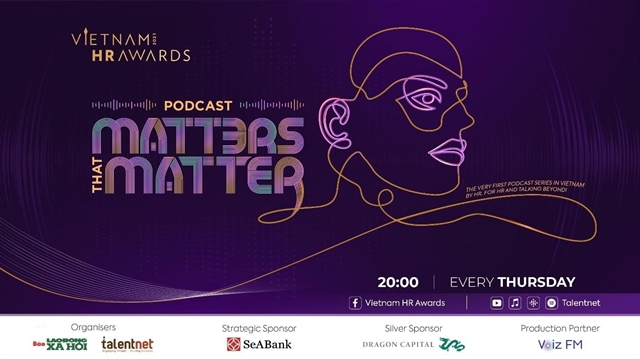 Economy
Economy


|
| The three episodes of Vietnam HR Awards podcast, the first of its kind in Việt Nam, will tell the stories that are beyond HR stories, ranging from how to improvise HR strategy in new normal to the changing demands of employees after COVID-19. — Photo courtesy of Talentnet |
HCM CITY — Business leaders are facing the challenge of developing comprehensive HR strategies to create physical, mental and financial wellness in employees and gain a head start in the race to attract talent post-COVID-19.
According to speakers in the first of a series of Việt Nam HR Awards podcasts by Talentnet, mental health would be a non-negotiable post-pandemic.
COVID has upended employees’ lives, pushing HR people to the frontlines to handle countless inquiries from them, including some “too personal” such as how to achieve work-life balance.
Speaking in the first episode, Nguyễn Hiếu Trường An, vice president, head of talent centre of excellence – APAC, Suntory Beverage & Food Asia, said, “I think mental wellness is a combination of innumerable factors and every employee has the right to demand it.
“There are no absurd demands from employees, the problem lies only with businesses as they may be unwilling to or incapable of satisfying their employees’ needs at the time.
“If and only if businesses can find the solution to this problem will they have productive human capital.”
His company organised numerous sessions with psychologists on effectively managing stress and personal relationships for their employees when they worked from home, he said.
Hans Nguyễn, senior advisor, distribution, Dragon Capital Vietnam, said employees could only achieve mental wellness when they find their jobs enjoyable and doable.
“To ensure this, HR departments and leaders need to keep the word ‘right’ in mind, meaning assigning the right work to the right talent, and ensure the job to the right employees’ preference. It sounds simple, but is hard to execute.”
Financial wellness, while relatively new in Việt Nam, has long been familiar to multinational businesses.
Based on his extensive experience in working in various markets such as Switzerland, the US and Việt Nam, Nguyễn suggested that domestic businesses should get used to the fact employees have the tendency to moonlight.
“Even if the compensation is great, workers will always desire to find other income sources. The challenge here is making sure the second job will not spark conflicts of interest with the main job.”
To guarantee benefits for both sides, he said businesses should pre-emptively “draw the path for ‘deer’” by providing information and organising training in investing and financial security.
Only then would employees have understanding of personal finance, and are able to safely increase their passive incomes, which in turn improves their standard of living, while still maintaining business productivity.
There is a trend of workers being interested in passive investing and improving their financial wellness, and businesses have to take note of this trend and support them, he said.
Speakers said every employee would have different demands in terms of happiness involving the three pillars: physical wellness, mental wellness and financial wellness, and when these demands are met, they would fully commit to their work. This is the key that HR leaders should recognise when trying to create a resourceful HR strategy centred on the people in the new normal.
The Việt Nam HR Awards podcast with the theme ‘Matters That Matter’, the first of its kind in Việt Nam, has three episodes at 8pm Thursdays starting on December 30.
It is available at the Vietnam HR Awards official fanpage, Spotify, Apple Podcast, Youtube, and Google Podcast. — VNS




